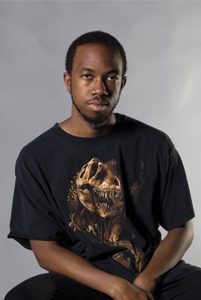Major: Visual Arts

Abstract: Filling the Void: Putting the Queer in Afrofuturism
Describe your project:
Afrofuturism is a concept, theoretical framework, and movement that incorporates the re-imagination, restructuring, and re-visioning of Blackness throughout the African Diaspora. Author Ytasha Womack defines it as an intersection of imagination, technology, the future, and liberation. Some examples of Afrofuturist artists include Janelle Monae, Sun Ra, and Samuel Delany. A founding literary figure of this movement is Octavia Butler, who was the author of this year’s UMBC New Student Book. Filling the Void: Putting the Queer in Afrofuturism is a project that looks at the ways queer individuals of the African Diaspora are partaking in Afrofuturism through a variety of mediums. The project looks at media analysis, internet culture, and pop culture as a call to action for more individuals to think about queerness fits into the sector of afrofuturism.
Who is your mentor for your project?
Dr. James Smalls, Professor and Chair of Visual Arts.
How did you find your mentor? Why did you choose them?
I took ART 329: Afrofuturism with him and that’s how met! As someone who helped me achieve a greater understanding and interest of Afrofuturism it only made sense for him to be my mentor.
How did you become interested in this project?
I became interested in this project through the readings we would do in class. Afrofuturism was something I was already interested in so I was so excited to join the course. But when the readings would mention queerness as it relates to Afrofuturism, I was a bit disappointed that a lot of them didn’t dive into the complexities as it relates to the queer body and aesthetic.
What has been the hardest part about your research/what was the most unexpected thing about being a researcher?
The hardest thing about my research is keeping up with the field. After I wrote my initial paper I learned about a lot of Afrofuturist literature through youtube user Onyx Pages. Thanks to her, I’ve been reading and learning more about the field and that there are other communities interested in Queer Afrofuturism.
What has been the most rewarding part?
The most rewarding is working with Afrofuturism, a concept that is expansive and fluid and learning about myself and my art through this process. Another huge reward is to see how many other people are interested and involved into the topic.
How will you disseminate your research?
I presented my research at the 29th Mid-Atlantic Popular & American Culture Association on November 9, 2018 at the Lord Baltimore hotel!
What is your advice to other students about getting involved in research?
My advice is to be as thorough, innovative, and creative as possible.
What are your career goals?
I want to continue to work in art and design while doing organizing and academic research.
11/13/18